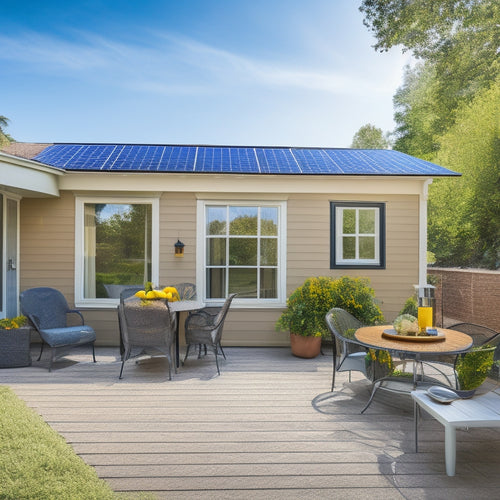
Solar Panels Affect Your Electricity Cost in 5 Key Ways
Share
By installing solar panels, you can greatly slash your electricity costs in multiple ways, potentially saving you thousands of dollars over the system's lifetime. You'll see reduced monthly utility bills, thanks to the renewable energy offsetting a substantial portion of your electricity costs. Additionally, net metering credits will accumulate, allowing you to sell excess energy back to the grid and offset consumption during low production periods. You'll also lower your peak hour consumption, capitalize on incentives and tax credits, and even increase your property value. As you investigate these benefits further, you'll uncover even more surprising ways solar panels can impact your electricity costs.
Key Takeaways
- Solar panels reduce monthly utility bills by offsetting a substantial portion of electricity costs, leading to long-term savings.
- Net metering credits accumulate, allowing homeowners to sell excess energy back to the grid and offset energy consumption during low production periods.
- Solar panels generate electricity during peak hours, reducing grid consumption and lowering electricity costs during high-demand periods.
- Incentives and tax credits, such as the Federal Solar Investment Tax Credit, can significantly reduce the upfront cost of solar panel installation.
- By reducing reliance on traditional energy sources, solar panels can increase property value and appeal, attracting eco-conscious buyers and boosting demand.
Reduced Monthly Utility Bills
With solar panels installed, you can expect a significant decrease in your monthly utility bills. This reduction is due to the fact that you're generating your own electricity, relying less on the grid, and thereby reducing your energy consumption.
The amount of energy savings you'll experience depends on the size of your solar panel system, your energy usage, and the amount of sunlight your panels receive.
By utilizing renewable energy from the sun, you'll be able to offset a substantial portion of your electricity costs. This translates to real savings, which can add up over time.
In fact, solar panels are considered a long-term investment, as they can last for up to 30 years or more. With a typical solar panel system, you can expect to save hundreds, if not thousands, of dollars on your utility bills over the course of its lifespan.
Net Metering Credits Accumulate
You'll also benefit from net metering, a program that allows you to sell excess energy back to the grid. When your solar panels produce more electricity than you're using at the moment, the excess energy is fed back into the grid and you're credited for it. This credit accumulation occurs through net metering, which measures the difference between the electricity you produce and the electricity you consume.
The utility company tracks your net metering credits, and you can use them to offset your energy consumption during periods when your solar panels aren't producing as much electricity, such as at night or during winter months. This means you'll draw less energy from the grid during these periods, reducing your reliance on traditional energy sources.
Net metering credits can also be carried over from month to month, allowing you to bank them for when you need them most. By accumulating net metering credits, you can further reduce your electricity costs and maximize the benefits of your solar panel system.
Lower Peak Hour Consumption
Since your solar panel system generates electricity during the day, it reduces your consumption from the grid during peak hours, typically between 11 am and 5 pm.
This reduction in consumption leads to lower electricity costs, as you're not relying as heavily on the grid during periods of high demand. As a result, you're achieving energy efficiency and reducing your overall energy expenditure.
During peak hours, utilities often charge higher rates due to increased demand. By generating your own electricity, you're reducing your reliance on the grid and, in turn, reducing your exposure to these higher rates.
This is known as demand response, where your solar panel system is responding to the grid's demand by reducing your energy consumption. By doing so, you're not only saving money but also reducing the strain on the grid during periods of high demand.
Incentives and Tax Credits
The investment in a solar panel system can pay off in more ways than one, as it opens the door to various incentives and tax credits.
You're not only reducing your electricity cost, but you're also eligible for federal and state benefits.
The federal government offers a Solar Investment Tax Credit (ITC), which allows you to claim a credit of 26% of the total cost of your solar panel system.
This credit can greatly reduce your federal tax liability, providing a substantial return on your investment.
Additionally, many states offer their own incentives, such as state credits, rebates, and property tax exemptions.
These incentives vary by state, but they can add up to considerable savings.
You may also be eligible for local incentives, such as rebates from your utility company or municipality.
Increased Property Value
Installing a solar panel system not only generates electricity cost savings and incentives, but it also enhances your property's value. As you invest in sustainable living and energy efficiency, you're not only reducing your carbon footprint but also increasing your property's appeal to potential buyers. According to the National Renewable Energy Laboratory, solar panels can increase your property value by up to $15,000.
| Feature | Impact on Property Value |
|---|---|
| Energy Efficiency | Increases property value by up to 10% |
| Sustainability | Appeals to eco-conscious buyers, increasing demand |
| Low Maintenance | Reduces maintenance costs, increasing property value |
| Government Incentives | Increases property value through tax credits and rebates |
| Aesthetic Appeal | Modern solar panels can increase curb appeal |
Frequently Asked Questions
Can I Install Solar Panels on a Rented Property?
You'll typically need to negotiate with your landlord and review your rental agreements to obtain necessary permissions before installing solar panels on a rented property, ensuring you're not violating any terms or breaching your lease.
How Long Does a Typical Solar Panel System Last?
As you capture the sun's fiery energy, you'll find a typical solar panel system's lifespan stretches like a golden thread, unwinding 25-30 years of reliable power, with efficiency degradation slowing to a crawl, ensuring a strong performance that won't leave you in the dark.
Can I Use Solar Panels With a Septic System?
You can integrate solar panels with a septic system, as they don't interfere with each other; however, you'll need to guarantee your septic system's electrical components, like pumps, are compatible with the variable power output of your solar panel integration.
Do Solar Panels Require Frequent Cleaning and Maintenance?
You'll need to clean your solar panels regularly to maintain their efficiency, but the frequency depends on your location and climate; typically, cleaning every 6-12 months is sufficient to guarantee peak energy production.
Can I Add More Panels to My Existing System Later?
As you build upon your solar foundation, you can scale up: adding more panels to your existing system is like adding bricks to a wall, but guarantee system expansion is done with panel compatibility in mind to maximize energy output.
Related Posts
-

Why Higher Upfront Costs Are Worth It
You pay a premium for high-quality, energy-efficient products, but they're worth it. With durability testing ensuring...
-

10 Tips to Buy Affordable Solar Panels Online
When purchasing affordable solar panels online, you'll want to research reputable retailers, compare prices, and chec...
-

10 Best Ways to Purify Urban Air With EVS
You're looking for ways to purify urban air with Electric Vehicles (EVs). You can start by incorporating EVS Air Filt...


